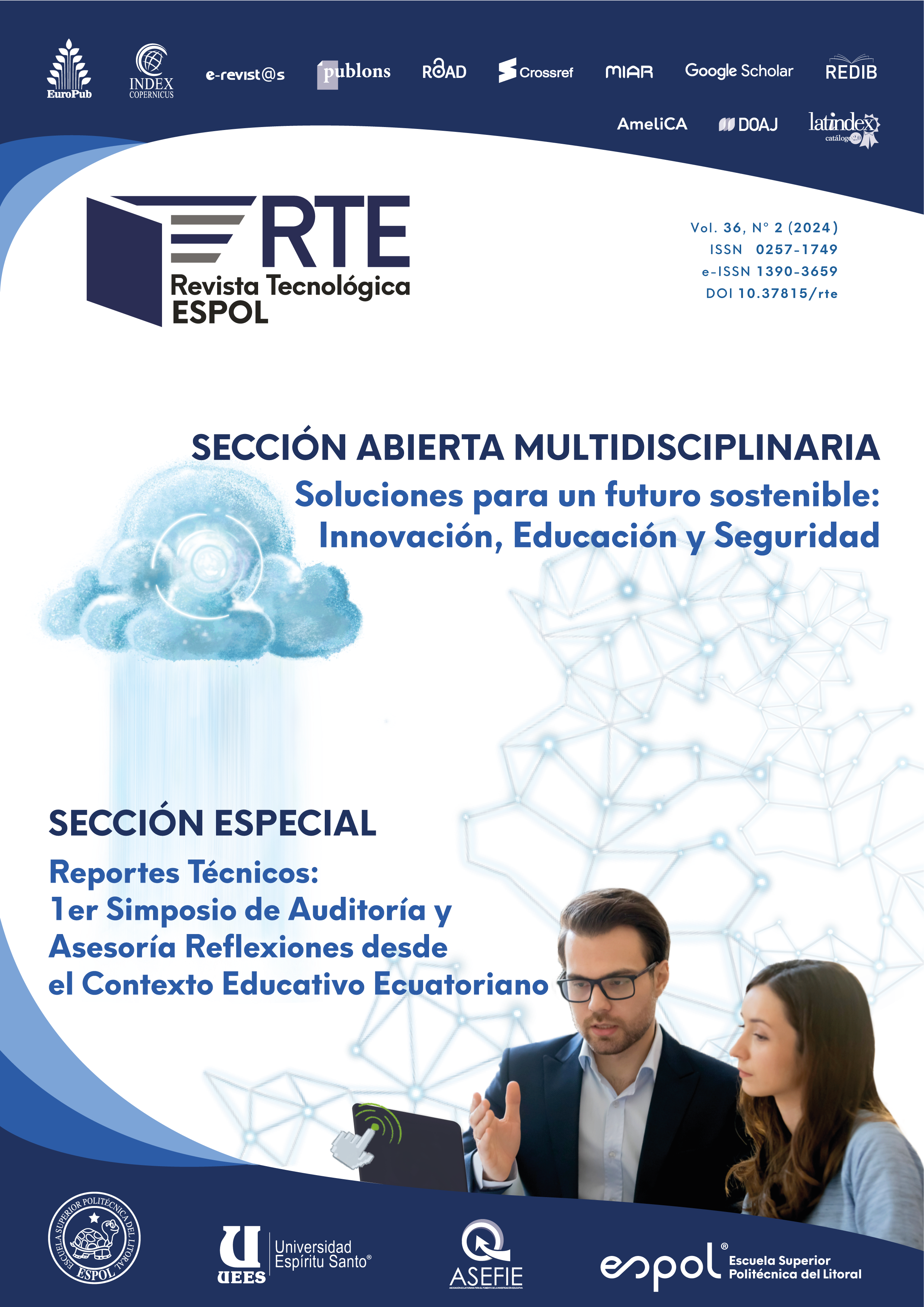La innovación constante de tecnologías para generar energía eléctrica mediante el uso de recursos renovables ha permitido que en los últimos años pueda ser competitiva con las tecnologías tradicionales hasta el punto de ser una gran opción en sistemas a gran escala. Actualmente, las nuevas tecnologías fotovoltaicas permiten obtener mayores eficiencias de conversión de energía, a la vez que reducen costos con la implementación de nuevos materiales, siendo este último criterio primordial para su posterior implementación a gran escala. Este artículo presenta una revisión de la literatura sobre la evolución tecnológica de generación solar fotovoltaica, evaluando y analizando únicamente artículos publicados en el periodo 2013-2023, mediante la metodología PRISMA (Preferred Reporting Items for Systematic Reviews, por sus siglas en inglés). De un total de 307 artículos identificados en prestigiosas bases de datos como Science Direct, IEEEXplore y Scopus, se ha seleccionado sistemáticamente y se ha revisado un subconjunto de 12 artículos científicos acorde a determinados criterios de inclusión y exclusión definidos por los investigadores. La síntesis del contenido de los artículos seleccionados revela que las tecnologías emergentes: células de multi-unión, de perovskita, células solares orgánicas y celdas de heterounión de película delgada, han logrado superar la eficiencia de las células solares convencionales y presentar precios más competitivos en pos facilitar la expansión de sistemas fotovoltaicos en múltiples aplicaciones.

Esta obra está bajo una licencia internacional Creative Commons Atribución-NoComercial 4.0.
Referencias
Abdellatif, S. Josten, A. S. G. Khalil, D. Erni, & F. Marlow. (2020). Transparency and Diffused Light Efficiency of Dye-Sensitized Solar Cells: Tuning and a New Figure of Merit. IEEE Journal of Photovoltaics, 10(2), 522–530. https://doi.org/10.1109/JPHOTOV.2020.2965399
An, J., Shen, Y., Roca i Cabarrocas, P., & Chen, W. (2022). Fabrication of Crystalline Si Thin Films for Photovoltaics. Physica Status Solidi - Rapid Research Letters, 16(12). Scopus. https://doi.org/10.1002/pssr.202200290
Araki, K., Tawa, H., Saiki, H., Ota, Y., Nishioka, K., & Yamaguchi, M. (2020). The outdoor field test and energy yield model of the four-terminal on si tandem PV module. Applied Sciences (Switzerland), 10(7). Scopus. https://doi.org/10.3390/app10072529
Bošnjaković, M., Santa, R., Crnac, Z., & Bošnjaković, T. (2023). Environmental Impact of PV Power Systems. Sustainability (Switzerland), 15(15). Scopus. https://doi.org/10.3390/su151511888
Boychev, B., & Petkova, P. (2023). Assessment of the Economic Efficiency of a Photovoltaic Plant for a Small and Medium-Sized Production Facility. 2023 15th Electrical Engineering Faculty Conference (BulEF), 1–3. https://doi.org/10.1109/BulEF59783.2023.10406203
British Petroleum. (2022). Statistical Review of World Energy 2022. https://www.bp.com/content/dam/bp/country-sites/es_es/spain/home/pdfs/noticias/Resumen%20Ejecutivo%20-%20STR.pdf
Chabla-Auqui, L., Ochoa-Correa, D., Villa-Ávila, E., & Astudillo-Salinas, P. (2023). Distributed Generation Applied to Residential Self-Supply in South America in the Decade 2013–2023: A Literature Review. Energies, 16(17), 6207. https://doi.org/10.3390/en16176207
Enaganti, P. K., Soman, S., Devan, S. S., Pradhan, S. C., Srivastava, A. K., Pearce, J. M., & Goel, S. (2022). Dye‐sensitized solar cells as promising candidates for underwater photovoltaic applications. Progress in Photovoltaics: Research and Applications, 30(6), 632–639. https://doi.org/10.1002/pip.3535
Ernst, M., Liu, X., Asselineau, C.-A., Chen, D., Huang, C., & Lennon, A. (2024). Accurate modelling of the bifacial gain potential of rooftop solar photovoltaic systems. Energy Conversion and Management, 300, 117947. https://doi.org/10.1016/j.enconman.2023.117947
Evola, G., & Marletta, L. (2014a). Exergy and thermoeconomic optimization of a water-cooled glazed hybrid photovoltaic/thermal (PVT) collector. Solar Energy, 107, 12–25. https://doi.org/10.1016/j.solener.2014.05.041
Galetovic, A., & Muñoz, C. (2009). Energías renovables no convencionales: ¿Cuánto nos va a costar? Estudios Públicos, 112. https://doi.org/10.38178/cep.vi112.461
Green, M. A., Dunlop, E. D., Siefer, G., Yoshita, M., Kopidakis, N., Bothe, K., & Hao, X. (2023b). Solar cell efficiency tables (Version 61). Progress in Photovoltaics: Research and Applications, 31(1), 3–16. https://doi.org/10.1002/pip.3646
Hallam, B., Kim, M., Underwood, R., Drury, S., Wang, L., & Dias, P. (2022). A Polysilicon Learning Curve and the Material Requirements for Broad Electrification with Photovoltaics by 2050. Solar RRL, 6(10). Scopus. https://doi.org/10.1002/solr.202200458
Hou, J., Inganäs, O., Friend, R. H., & Gao, F. (2018). Organic solar cells based on non-fullerene acceptors. Nature Materials, 17(2), 119–128. https://doi.org/10.1038/nmat5063
Imran, H., Durrani, I., Kamran, M., Abdolkader, T. M., Faryad, M., & Butt, N. Z. (2018). High-Performance Bifacial Perovskite/Silicon Double-Tandem Solar Cell. IEEE Journal of Photovoltaics, 8(5), 1222–1229. IEEE Journal of Photovoltaics. https://doi.org/10.1109/JPHOTOV.2018.2846519
Jackson, P., Hariskos, D., Wuerz, R., Wischmann, W., & Powalla, M. (2014). Compositional investigation of potassium doped Cu(In,Ga)Se 2 solar cells with efficiencies up to 20.8%. Physica Status Solidi (RRL) – Rapid Research Letters, 8(3), 219–222. https://doi.org/10.1002/pssr.201409040
Jiang, Q., Song, Z., Bramante, R. C., Ndione, P. F., Tirawat, R., Berry, J. J., Yan, Y., & Zhu, K. (2023). Highly efficient bifacial single-junction perovskite solar cells. Joule, 7(7), 1543–1555. https://doi.org/10.1016/j.joule.2023.06.001
Khatoon, S., Kumar Yadav, S., Chakravorty, V., Singh, J., Bahadur Singh, R., Hasnain, M. S., & Hasnain, S. M. M. (2023). Perovskite solar cell’s efficiency, stability and scalability: A review. Materials Science for Energy Technologies, 6, 437–459. https://doi.org/10.1016/j.mset.2023.04.007
Li, W., Wang, D., Zhou, Q., & Dong, H. (2021). Energy Efficiency Evaluation of Photovoltaic Power Generation System Based on Analytic Hierarchy Process and Fuzzy Comprehensive Evaluation. 2021 IEEE 5th Conference on Energy Internet and Energy System Integration (EI2), 1029–1034. https://doi.org/10.1109/EI252483.2021.9713643
Liu, Shi, G., Liu, Z., & Ma, W. (2021). Toward printable solar cells based on PbX colloidal quantum dot inks. Nanoscale Horizons, 6(1), 8–23. Scopus. https://doi.org/10.1039/d0nh00488j
Liu, Zhou, K., Wang, J., Gui, R., Xian, K., Gao, M., Yin, H., Hao, X., Zhou, Z., & Ye, L. (2022). An Aggregation-Suppressed Polymer Blending Strategy Enables High-Performance Organic and Quantum Dot Hybrid Solar Cells. Small, 18(19). Scopus. https://doi.org/10.1002/smll.202201387
Ozden, T., Carr, A. J., Geerligs, B. (L. J. ), Turan, R., & Akinoglu, B. G. (2020b). One-year performance evaluation of two newly developed back-contact solar modules in two different climates. Renewable Energy, 145, 557–568. https://doi.org/10.1016/j.renene.2019.06.045
Page, M. J., McKenzie, J. E., Bossuyt, P. M., Boutron, I., Hoffmann, T. C., Mulrow, C. D., Shamseer, L., Tetzlaff, J. M., Akl, E. A., Brennan, S. E., Chou, R., Glanville, J., Grimshaw, J. M., Hróbjartsson, A., Lalu, M. M., Li, T., Loder, E. W., Mayo-Wilson, E., McDonald, S., … Moher, D. (2021). The PRISMA 2020 statement: An updated guideline for reporting systematic reviews. The BMJ, 372. Scopus. https://doi.org/10.1136/bmj.n71
Parhamfar, M., Sadeghkhani, I., & Adeli, A. M. (2024). Towards the net zero carbon future: A review of blockchain-enabled peer-to-peer carbon trading. Energy Science and Engineering, 12(3), 1242–1264. Scopus. https://doi.org/10.1002/ese3.1697
Pica, A. T., & Sauma, E. E. (2015). Los desafíos de la utilización de energías renovables no convencionales intermitentes.
Reinhard, F. Pianezzi, B. Bissig, A. Chirilă, P. Blösch, S. Nishiwaki, S. Buecheler, & A. N. Tiwari. (2015). Cu(In,Ga)Se$_{bf 2}$ Thin-Film Solar Cells and Modules—A Boost in Efficiency Due to Potassium. IEEE Journal of Photovoltaics, 5(2), 656–663. https://doi.org/10.1109/JPHOTOV.2014.2377516
Saïdi, H., Ben Alaya, C., Boujmil, M. F., Durand, B., Lazzari, J. L., & Bouaïcha, M. (2020). Physical properties of electrodeposited CIGS films on crystalline silicon: Application for photovoltaic hetero-junction. Current Applied Physics, 20(1), 29–36. Scopus. https://doi.org/10.1016/j.cap.2019.09.015
Solano, J. C., Herrera, V., Ordóñez, Á., Caraballo, M., & Lozano, A. (2024). Economic Analysis of Residential Photovoltaic Self-Consumption in Ecuador: Simulation Tool. Green Energy and Technology, 57–69. Scopus. https://doi.org/10.1007/978-3-031-52171-3_4
Srivishnu, K. S., Rajesh, M. N., Prasanthkumar, S., & Giribabu, L. (2023). Photovoltaics for indoor applications: Progress, challenges and perspectives. Solar Energy, 264, 112057. https://doi.org/10.1016/j.solener.2023.112057
Vishkasougheh, M. H., & Tunaboylu, B. (2013). Simulation of high efficiency silicon solar cells with a hetero-junction microcrystalline intrinsic thin layer. Energy Conversion and Management, 72, 141–146. https://doi.org/10.1016/j.enconman.2012.10.025
Wang, F., & Wu, J. (2023). Applications in solar thin films. En Modern Ion Plating Technology: Fundamentals and Applications (pp. 321–340). Scopus.
White, N. N. Lal, & K. R. Catchpole. (2014). Tandem Solar Cells Based on High-Efficiency c-Si Bottom Cells: Top Cell Requirements for >30% Efficiency. IEEE Journal of Photovoltaics, 4(1), 208–214. https://doi.org/10.1109/JPHOTOV.2013.2283342
Würfel, U., Herterich, J., List, M., Faisst, J., Bhuyian, M. F. M., Schleiermacher, H.-F., Knupfer, K. T., & Zimmermann, B. (2021). A 1 cm 2 Organic Solar Cell with 15.2% Certified Efficiency: Detailed Characterization and Identification of Optimization Potential. Solar RRL, 5(4), 2000802. https://doi.org/10.1002/solr.202000802
Xu, W., Yao, X., Wu, H., Zhu, T., & Gong, X. (2020). The compositional engineering of organic–inorganic hybrid perovskites for high-performance perovskite solar cells. Emergent Materials, 3(6), 727–750. Scopus. https://doi.org/10.1007/s42247-020-00128-8
Za’abar, F. I., Yusoff, Y., Mohamed, H., Abdullah, S. F., Mahmood Zuhdi, A. W., Amin, N., Chelvanathan, P., Bahrudin, Mohd. S., Rahman, K. S., Samsudin, N. A., & Wan Abdullah, W. S. (2021). A Numerical Investigation on the Combined Effects of MoSe2 Interface Layer and Graded Bandgap Absorber in CIGS Thin Film Solar Cells. Coatings, 11(8), 930. https://doi.org/10.3390/coatings11080930
Zhang, H., Yu, Z., Zhu, C., Yang, R., Yan, B., & Jiang, G. (2023). Green or not? Environmental challenges from photovoltaic technology. Environmental Pollution, 320. Scopus. https://doi.org/10.1016/j.envpol.2023.121066







